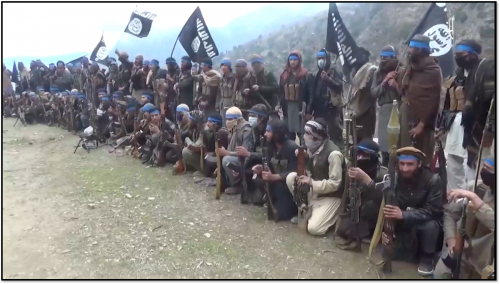Tarjuman Al-Asawirti, a pro-Islamic State (ISIS) media outlet, released a video in English titled “The Crusade Shaming Tactics.” The video starts with the following message, “Manipulators use strategies to make others feel pitiful and they can make one feel humiliated for daring to challenge. It is an effective way to foster a sense of inadequacy.
By Soumya Awasthi
The Crusaders used this tactic against Muslims to change their religious behaviour. For this reason, God warned his Prophet, peace be upon him, not to accept anything from the infidels that might lead to reconciliation with them. This is not to accept any opinion or criticism from the polytheists. Today, many Muslims have become victims of this tactic with which the Crusaders control their minds and behaviour. Some of the muslims became apostates seeking the approval of the Crusaders.”
In this video, the Islamic State calls the Taliban apostates, submissive to the crusaders (America). The video’s narrator referred to Al Qaeda and the Taliban as “Crusader’s Coalition” and groups like Hamas, Muslim Brotherhood and Jabhat Al-Nusra, who are together known as Hayat Tahrir Al-Sham (HTS). The video from Islamic State presents Taliban as a weak group that has rejected the principals of Islamic Caliphate. The video continues to argue that the group has forgotten its objectives and has become a nationalistic state, a western value against the spirit of Pan-Islamism. Also, this is the reason that America was successful in manipulating the Taliban, making Afghanistan dependent on crusaders for its economy.
The objective of the Islamic State in Afghanistan is to gain dominance for their larger goal, which is to influence the entire subcontinent. The Islamic State of Khorasan Province (ISKP) is supposedly the core of IS, and therefore the group aims to cease its control of Central and South Asia under the banner of the Caliphate. ISKP, an offshoot of ISIS, emerged in 2014 with sporadic fighting and violent expansion. However, ISKP has been struggling to gain a foothold in Afghanistan for the last few years, but they have failed in doing so, losing its operational capabilities. Moreover, since IS lost its territories in Iraq and Syria, it has renewed its focus on South Asia, with Afghanistan as one of its primary centre. As a result, they tailored propaganda for the audience in South Asia through Voice of Hind, an e-magazine and Voice of Khorasan, a radio broadcast in 2020 and 2021, respectively. From an initial figure of 8500 fighters in the group, the current figure has dwindled somewhere between 1500-2200 operating as sleeper cells. Consequently, due to the loss of territory, finance and members, the group failed to exercise adequate control; there were also internal dispute amongst the ranks regarding the tribal ethnicities and nationalities of its senior members. As per the Center for Strategic and International Studies, the number of attacks by ISKP in 2021 has been below 100, apart from the month of August 2021, which was the deadliest month since July 2018.
Despite all the low points in the trajectory of ISKP, it cannot be argued that ISKP is less of a threat given its constant efforts to spread the propaganda. The rise of ISKP in a stronger position can have spillover effects in the region. At the same time, India has all the right to be apprehensive of militants encouraged by the return of the Taliban and infiltration of Pakistan based terror groups into India. Moreover, ISKP has been trying to recruit Indians and their possible connections with Lashkar-e-Taiba (LeT).
Similarly, for China, the security concerns emanate from the East Turkestan Islamic Movement (ETIM) and some of its members being absorbed by ISKP. This merger has increased the possibility of orchestrating attacks in the Xinjiang province. Further, China has significant economic investments in Afghanistan apart from the ambition of expanding the China Pakistan Economic Corridor to Kabul. The Chinese investments not only serve Beijing’s economic interests but also provide it a degree of security assurance due to its close relationship with the Taliban ruled Afghanistan.
Due to a reduction in the footprint of international forces in Afghanistan, the Islamic State of Khorasan Province is looking for an opportunity to regroup and increase the frequency of its attacks. But it can be thwarted if countries like Pakistan and China do not turn a blind eye toward the group for their vested interests. Simultaneously, the regional countries need to enhance their cybersecurity measures and deny the virtual presence to the group.
The withdrawal of the coalition forces from Afghanistan has given a blow to the counter-terrorism efforts in the region. There could be a possibility of America and the Taliban coming together temporarily to counter the ISKP but relying completely on Taliban may not be practical. Perhaps coming together of regional powers to counter and defeat the ISKP presence in the region is needed for regional security. Unless a coherent strategy is formulated, ISKP might continue to pose security challenges for the region.
This article first appeared in www.vifindia.org and it belongs to them.












